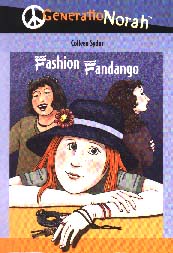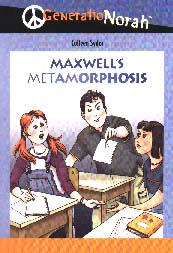|
________________
CM . . . .
Volume VII Number 8 . . . . December 15, 2000
excerpt: Norah...stepped into the hall. Maxwell was waiting for her.Norah, the impulsive star of Colleen Sydor's picture book, Smarty Pants, (winner of a 2000 McNally Robinson Award) reappears in a new series of novels. The two titles released so far are Fashion Fandango and Maxwell's Metamorphosis. In Fashion Fandango, Norah is selected as a grade six peer mediator, and, along with her friend, Frankie, Norah attends the weekend workshop/camping trip. They share a cabin with popular Barbara-Jane who accuses Frankie of stealing her designer sweatshirt. Norah puts her newly acquired skills as mediator to work. In Maxwell's Metamorphosis, Nora takes her role as peer mediator seriously. When first grader Laura entrusts her with the secret that she's afraid to use the school washroom, Norah breaks a rule to take Laura (rhyming names can be confusing!) home at recess. Maxwell, new boy and bully, has Norah targeted for blackmail. He knows she plans to share Laura's secret with her friend Frankie and that she's keeping quiet about Laura's trips home. Norah learns of Maxwell's own insecurities and his artistic talents and uses this knowledge to effect a positive change in his attitude. Transposing a successful character from one genre to another is a worthwhile idea, but it isn't that easy. Unfortunately, Norah has lost much of her original spark with the additional length of text. In these novels, she comes across as rather ordinary as well as far too serious and sensible. "[Norah] admired how they listened patiently to squabbles at recess and helped kids come up with fair solutions to their problems. She watched as they bandaged scraped knees and dried tears of the first and second graders. Most of all, she envied the respect peer mediators got as they walked confidently through the halls between classes. Norah wanted to be a peer mediator."She is friendly, kind-hearted and honest with no apparent need to undergo any metamorphosis by the end (unlike Maxwell, who rates title status in the second book). It's hard to empathize with her angst over being chosen as a mediator, an angst which lasts for nearly half the first book, when there's little reason to suggest why she won't be successful. Norah's fun-loving Auntie Norah, who originally played a major role in bringing Norah's character to life and who was a source of humor, makes only brief appearances in these novels. While it was the Norah character who inspired the series, these books are plot driven. Peer mediation is an interesting choice of topic. The challenge, though, is to keep the pace lively and the approach light enough to sustain reader curiosity without letting the message become didactic. Humor and suspenseful action would give Norah opportunities to shine, and these stories could use more of both. There are details which stretch credibility. For example, Laura's emotional problem in Maxwell's Metamorphosis is based on a traumatic association with the color of the washroom walls. But Norah is left to deal with it with no adult involvement (parents are all but invisible, and where is the supervising teacher at recess?). Also, Maxwell's negative and sometimes cruel behaviour is the result of changing schools several times, and yet he responds immediately when Norah simply points out his drawing talent. Both of these incidents seem well beyond the intended responsibility level of a peer mediator. The plot structure in Fashion Fandango is weak. The initial problem (Norah's wish to be a mediator) is solved before mid-book. The main action and conflict, which takes place in the last half between two secondary characters, was only briefly alluded to earlier. Norah, as mediator, becomes mostly a bystander while the dialogue is dominated through several pages by Barbara-Jane and Frankie. This approach does little to showcase Norah's character, although it gives a practical demonstration of peer mediation. The reading level is appropriate for the grade 3-6 audience. The covers are distinctive. There may not be enough substance to encourage readers to search out any further titles in the series. Recommended. Gillian Richardson, who lives in BC, is a former teacher-librarian and a published writer of children's fiction and nonfiction.
To comment on this title or this review, send mail to cm@umanitoba.ca.
Copyright © the Manitoba Library Association.
Reproduction for personal use is permitted only if this copyright notice
is maintained. Any other reproduction is prohibited without
permission.
Published by
TABLE OF CONTENTS FOR THIS ISSUE - December 15, 2000.
AUTHORS |
TITLES |
MEDIA REVIEWS |
PROFILES |
BACK ISSUES |
SEARCH |
ORDER |
CMARCHIVE |
HOME
|

